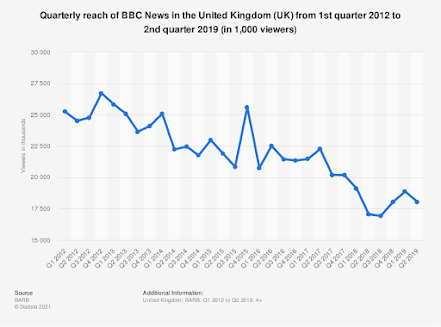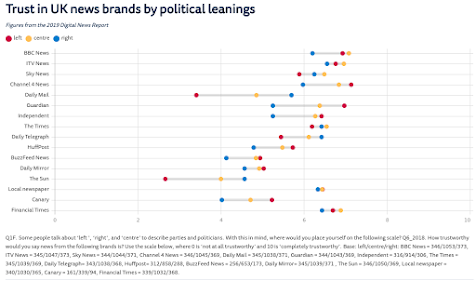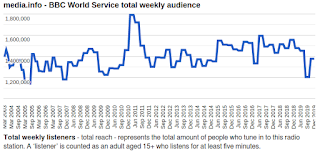The BBC has been subject to dramatic changes in its Charter over the past 14 years and this has had a deeply negative effect on the Corporation.
The BBC Charters until 2007 placed the BBC under fairly tight government control and used general advisory and national broadcasting councils to monitor fairness and content. In 2007 the broadcasting councils were removed and a new structure imposed which included Ofcom as the overseer of BBC bias and content (Ofcom is famously ineffectual, it even has a shocking Trustpilot rating of 1.5 stars). Unfortunately the 2007 Charter was very weak on fairness and bias which allowed the BBC to become partisan. There was nothing but Ofcom to stop this. The BBC speciality was to omit coverage of news or background information that did not reinforce the views of its staff on the issue of the day. As an example it did not ever present information on the UK balance of trade or current account balance with the EU during the entire period of the trade negotiations with the EU.
BBC TV news suffered a sudden drop of around 5m viewers after the EU Referendum. The BBC was widely perceived to be biased during the Referendum and its most prominent presenter at the time, John Humphrys (who voted Remain) confessed that bias was rife in the BBC. See Broadcaster John Humphrys savages bias at the BBC.
 |
| BBC News loses 1m viewers a year |
In 2017 the Charter was radically changed to include a fuller description of the public purposes of the BBC, in particular its public purpose when delivering news was explained:
“To provide impartial news and information to help people understand and engage with the world around them: the BBC should provide duly accurate and impartial news, current affairs and factual programming to build people’s understanding of all parts of the United Kingdom and of the wider world. Its content should be provided to the highest editorial standards. It should offer a range and depth of analysis and content not widely available from other United Kingdom news providers, using the highest calibre presenters and journalists, and championing freedom of expression, so that all audiences can engage fully with major local, regional, national, United Kingdom and global issues and participate in the democratic process, at all levels, as active and informed citizens.”
This did not go far enough because the BBC, in the period 2007 to 2017 had refined a technique of anecdotal interviews where erudite interviewees supported one view and dissolute or intellectually challenged interviewees the other and it routinely omitted any news or information that supported views contrary to those of the producers.
However, outside of the Referendum the BBC News still appears to be trusted, especially by the left and centre, probably because the viewers are unaware that the BBC Charter offered no protection against bias from 2007 to 2017.
 |
| Source: Reuters Institute |
Any new Charter must address the problem of anecdotal interviews and the omission of news and information that supports non-BBC views. The role of Ofcom should be replaced by a Broadcast Advisory Council with an explicit brief to monitor bias and to contain campaigning by BBC producers, even if these campaigns appear justified. Campaigns can be implemented through current affairs and drama and can be identified by the frequency with which a particular viewpoint is being expressed. It cannot be the role of the National Broadcaster to indoctrinate the population even if the BBC management believes that a campaign is for the “good” of the country.
The overseas broadcasts of the BBC are particularly worrying. Any new Charter will need to impose a pro-British stance on the BBC that is implemented through Foreign Office monitoring. Although the BBC produces viewing figures that suggest it is a huge “success” overseas it is apparent to any traveller that the BBC is steadily being demoted in hotel satellite TV menus and increasingly entirely missing. This is especially the case in Muslim and staunchly Catholic areas such as Central and South America. Hoteliers in these areas often find BBC content disgusting and biased. In Central Asia and China the BBC is largely unavailable. China Global is rapidly replacing the BBC globally and I hate to say that its content is often surprisingly balanced and sober to lure in the overseas audience. The BBC cannot represent the UK abroad if it alienates the audience that it really needs to reach. BBC global services are also nakedly Internationalist which leads them to portray the UK as “just another country” to such an extent that it is frequently anti-British. We should not be paying licence fees so that the BBC can crow about high viewing figures in the USA and India when these are based on anti-British sentiment.
The BBC Radio World Service is maintaining its audience but the reservations mentioned above about BBC global TV also apply to radio. Again the Foreign Office should closely monitor content to ensure that it is consistent with the interests of the UK.
 |
| media.info |
The integration of the BBC global and national newsrooms is having a pernicious effect on news coverage with the Internationalist viewpoint being foist on the national audience. (Today the entire one o’clock news on Radio 4 was devoted to Biden’s inauguration).
The USA is a clear example of the damage that can be done by permitting the mainstream media to be partisan – see The Mainstream Media are to Blame for Political Unrest – like the UK the USA deregulated its media in the 21st century and has demonstrated the consequences.
This article was originally published by the author on his personal blog: https://pol-check.blogspot.com/2021/01/the-bbc-need-for-change.html
 Daily Globe British Values, Global Perspective
Daily Globe British Values, Global Perspective




